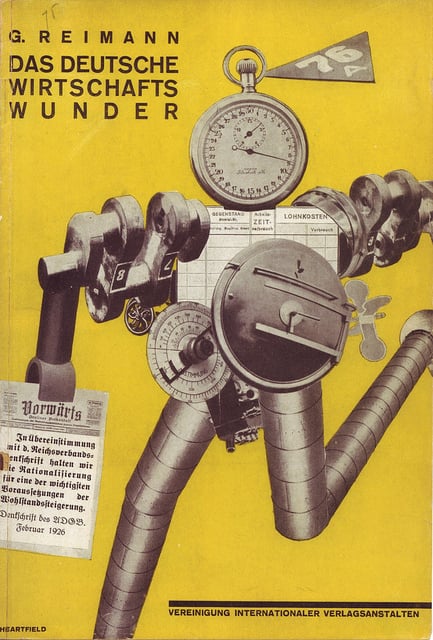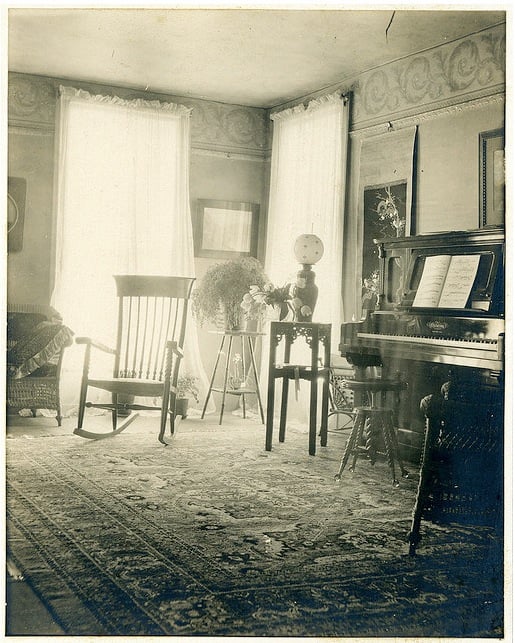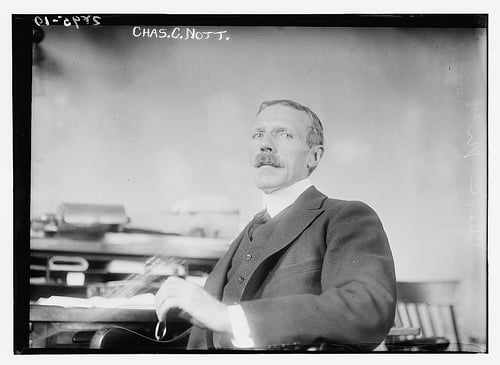The Clockwork Man (17)
By:
July 10, 2013

HILOBROW is pleased to present the seventeenth installment of our serialization of E.V. Odle’s The Clockwork Man. New installments will appear each Wednesday for 20 weeks.
Several thousand years from now, advanced humanoids known as the Makers will implant clockwork devices into our heads. At the cost of a certain amount of agency, these devices will permit us to move unhindered through time and space, and to live complacent, well-regulated lives. However, when one of these devices goes awry, a “clockwork man” appears accidentally in the 1920s, at a cricket match in a small English village. Comical yet mind-blowing hijinks ensue.
Considered the first cyborg novel, The Clockwork Man was first published in 1923 — the same year as Karel Capek’s pioneering android play, R.U.R.
“This is still one of the most eloquent pleas for the rejection of the ‘rational’ future and the conservation of the humanity of man. Of the many works of scientific romance that have fallen into utter obscurity, this is perhaps the one which most deserves rescue.” — Brian Stableford, Scientific Romance in Britain, 1890-1950. “Perhaps the outstanding scientific romance of the 1920s.” — Anatomy of Wonder (1995)
In September 2013, HiLoBooks will publish a gorgeous paperback edition of The Clockwork Man, with a new Introduction by Annalee Newitz, editor-in-chief of the science fiction and science blog io9. Newitz is also author of Scatter, Adapt, and Remember: How Humans Will Survive a Mass Extinction (2013) and Pretend We’re Dead: Capitalist Monsters in American Pop Culture (2006).
SUBSCRIBE to HILOBROW’s serialized fiction via RSS.
ALL EXCERPTS: 1 | 2 | 3 | 4 | 5 | 6 | 7 | 8 | 9 | 10 | 11 | 12 | 13 | 14 | 15 | 16 | 17 | 18 | 19 | 20
Shortly after midnight the Doctor’s expectant ear caught the sound of someone alighting from a bicycle. A moment later footsteps clattered down the area stairs, and Gregg, still attired in his cricket flannels, appeared at the open door. The smile faded from his lips as he beheld the drawn, agitated features of the Doctor.
“Hulloa,” he exclaimed, “you look pretty bent.”
The Doctor shut the door carefully and lifted a warning finger. “Gregg, this thing must never be known. It must never go beyond ourselves.”
“Why not?” Gregg sat down on the couch and twisted his hat idly between his fingers.
“Because,” said the Doctor, trying hard to control the twitching of his features, “it’s too terrible. What I have seen to-night is not fit for mortal eye to behold. It’s inhuman. It’s monstrous!”
He sank into a chair and covered his face with his hands. The presence of another person brought a kind of relief to his pent-up feelings. He let himself go.
“Oh, God, it’s the end of all things, Gregg. It’s the end of all sane hopes for the human race. If it is true that in the future man has come to this, then the whole of history is a farce and mockery. The universe is no more than a box of conjuring tricks, and man is simply a performing monkey. I tell you, Gregg, this discovery, if it is made known, will blast everything good in existence.”
“Stop a minute,” exclaimed Gregg, arising in sheer astonishment, “you seem to be upset. I don’t understand what you are raving about.”
The Doctor stabbed a finger wildly in the direction of the coal cellar. “If you had seen what I have seen to-night, you would understand. You would be feeling exactly as I am now.”
Gregg placed a hand soothingly upon his friend’s shoulder. “Why didn’t you send for me before? You’re over-strung. This experience has been too much for you.”
“I grant you that,” said the Doctor, hollowly, “I know only too well what effect this shock will have upon me. You are a younger man than I am, Gregg. I am glad you have been spared this sight.”

“But where is the Clockwork man?” demanded Gregg, presently.
The Doctor’s finger again indicated the coal cellar. “He — he’s in there — I — I managed to stop him. He — he’s in a kind of sleep.”
And then, as Gregg took a leisurely stride towards the door, as though to investigate matters on his own, the Doctor caught hold of his sleeve. “Don’t do that. Listen, first, to what I have to tell you. I rather fancy it will take the edge off your curiosity.”
Gregg swung round and sat on the couch. He lit a cigarette. He made no effort to conceal his sense of superior self-possession. The doctor took the cigarette that was preferred to him, and leaning forward tried to take a light from his companion. But his hand shook so violently that he could not manage the simple operation. In the end Gregg lit another match and held it with a steady hand.
As the Doctor told the story of what had taken place so recently in the little room, Gregg sat nursing an uplifted knee between his hands and with the cigarette drooping idly from his lips. Once or twice he interrupted with a gesture, but if he experienced astonishment he never betrayed the fact. Even the description of the sudden growth of beard did not disturb the look of calm enquiry upon his hard-set features. He seemed to be following something in his mind that elucidated the facts as they came out; and as the narrative drew to a close he nodded his head very slightly, as though having found corroboration for these strange events in some theory of his own, and vice versa. When at last the Doctor reached the climax of his tale there was no horror written upon Gregg’s countenance. He remained impassive, a sort of buffer against which the Doctor’s hysterical phrases recoiled in vain.
There was a moment’s silence. The Doctor had been talking so rapidly, and he had been so swayed by his feelings, that he had scarcely noticed the other’s demeanour. When he looked up Gregg was walking with a measured tread up and down the floor. He had dropped his cigarette, and his mouth was formed in the act of whistling. The Doctor started to his feet.
“What! You believe it then? You, who have not seen this mystery — you believe it?”
“Why not?” Gregg paused in his walk and looked genuinely surprised.
“But — surely!” The Doctor sat down again and groaned. “Surely you cannot accept such a story without a sign of incredulity? What state of mind is that which can believe such things without having seen them? Why, you credulous fool, I might have invented the whole thing!”
Gregg smiled. “I am one of those who are prepared to accept the miraculous at second-hand. Besides, you forget that I have already witnessed some of the Clockwork man’s manifestations of ingenuity. Nothing that you have told me causes me more astonishment than I experienced on the first occasion we had reason to believe the Clockwork man was — what he is. It is all, to my mind, quite natural and logical.”
“But you must admit,” interpolated the Doctor, “that I might be deceiving you. I could easily do it, just to prove you in the wrong. I can assure you that nothing would suit my humour better at the present moment! Instead of which it is I who appear the fool. I never wanted to believe in the Clockwork man. I was angry with you for believing in him. Admit that it would be a just revenge on my part to hoax you.”
Gregg shook his head. “You might try to do such a thing, but you would certainly fail. Besides, I know you are telling the truth. Your manner plainly shows it.”
He sat down on the couch again. “Perhaps it is just as well that I did believe in the Clockwork man from the first; for while you have been going through these unpleasant experiences I have been thinking very hard, and have actually arrived at certain conclusions which are, I venture to think, amply confirmed by your story. That is why I have shown no surprise at your statements. The Clockwork man is indeed true to his type as I have imagined him; he is the very embodiment of the future as I have long envisaged it.”
At these words the Doctor threw up his arms in despair. “Then I write myself down a fool,” he exclaimed, “I had no such wild hope, or such equally wild despair, with regard to the future of the human race. I admit that I have been behindhand. These matters have slipped from my grasp. The calls of ordinary life have claimed me, as they must every man past his first youth. But I am ready to believe anything that can be explained.”
“It is precisely because the Clockwork man can be explained,” interrupted Gregg, with some eagerness, “that I find it easy to believe him.”
“But how can you explain him?” protested the Doctor, with some trace of his old irritation. “You have not even seen the clock.”

“Your description of it is quite good enough for me,” rejoined the other, with emphasis, “I can see it in my mind’s eye. Moreover, it was obvious to me, from the first, that there must exist some such instrument in order that the Clockwork man might be adjusted when necessary. One deduced that.”
The Doctor shuddered slightly, and leaned his head upon his arm. “Consider yourself lucky that you never did see the clock, and that you never had the opportunity of testing its efficiency. It is all very well for you to wax enthusiastic over your theories, but facts are hard masters.”
“Precisely,” said Gregg, who was beginning to grow impatient with the other’s manner, “and since the facts have revealed themselves, what is the use of trying to evade them? Here we have a Clockwork man, a creature entirely without precedent, for there is no record of his having existed in the past, and so far as we know there has been no successful attempt to create such a being in our own times. Everything favours my original hypothesis; that he has in some way, and probably through some fault in the mechanism that controls him, lapsed into these earlier years of human existence. That seems to me feasible. If man has indeed conquered time and space, then the slightest irregularity in this new functioning principle would result in a catastrophe such as we must suppose has happened to the Clockwork man. It is more than probable that a slight adjustment would result in his speedy return to conditions more proper to his true state.”
“But this does not explain him,” broke in the Doctor, bitterly.
“Wait, I am coming to that. We have to get the facts firmly in our heads. First of all, there is a mechanism, a functioning principle, which causes certain processes to take place, and enables the Clockwork man to behave as no ordinary human being ever could behave. What that functioning principle is we do not yet know; we can only posit its existence — we must do that — and draw what inference we can from its results. Now, the effect of the functioning principle is clear to me, if the cause is hidden. Obviously, the effect of the mechanism is to accelerate certain processes in the purely human part of the Clockwork man’s organism to such an extent that what would take years, or even generations, to take place in ordinary mortals, takes place instantaneously. Witness the growth of beard, the changes in appearance, the total collapse. Obviously, these physiological variations occur in the case of the Clockwork man very rapidly; and by adjustment any change may be produced. The problem of his normal existence hangs upon the very careful regulation of the clock, which, I take it, is the keyboard of the functioning principle. But what concerns us at present is the fact that this power of rapid growth makes the Clockwork man able to act in complete defiance of our accepted laws relating to cause and effect.”
“We had an argument about that,” said the Doctor, dismally. “He tried to explain that to me, but I must say he was no more successful than you are. The whole thing is a complete haze.”
But Gregg took little notice of the interruption. “Once you have grasped this idea of a new sort of relativity,” he continued, “once you have realised that the Clockwork man behaves in accordance with laws quite different to our own, you can proceed to find some basis for such a phenomenon. The Clockwork man behaves in a certain manner; therefore there must be some cause, however improbable it may appear to us, to account for such behaviour. Now, what is the cause of ordinary human action? It is something equally unaccountable. We can explain it in terms of a system, of a series of processes, but we do not really know what is the secret spring upon which the human animal moves. We can describe the machinery of the human body, but we do not really know what life is, or what is the real nature of the force that produces our actions. So far we know as much about the Clockwork man as we do about ourselves. The difference is confined to processes.”
“All this is obvious,” said the Doctor, “I have seen enough to convince me of that.”
“Precisely. And because you have seen more than I have you are less able to understand the matter than I am. You cannot see the wood for the trees. Again, you were frightened out of your life. Your scientific instincts were stampeded. You saw only a hideous malformation, a neural freak, a preposterous human machine. It was inconceivable that you should have been able to think clearly under the circumstances. Consider the matter in the sober aftermath of reason, and you must agree with me that it is really not more extraordinary that a man should function by mechanical means than that he should function at all.”
“I don’t agree,” retorted the Doctor, with unexpected sharpness. “I think it is far more amazing that a human being should function as he does, than that he should be made to function differently by mechanical means. The Clockwork man is no more wonderful, in that sense, than you or I. He is simply different — damnably different.”
Gregg laughed softly. “Well, that is only another way of saying what I have already said. You seem to regard the Clockwork man as a sort of offence; he upsets your sense of decency. To me he is profoundly interesting. I accept him, and all that his curious constitution implies. Think of the triumph for the human brain. For man, thanks to this stupendous invention of the clock, has actually enlarged the universe.”
“A multiform world,” murmured the Doctor, recollecting the Clockwork man’s description, “a world of many dimensions.”
“Yes,” echoed Gregg enthusiastically, “a multiform world. A world in which man moves as he will, grows as he will, behaves in every way exactly as he wills. A world set free! Think of what it means!”
RADIUM AGE SCIENCE FICTION: “Radium Age” is HILOBROW’s name for the 1904–33 era, which saw the discovery of radioactivity, the revelation that matter itself is constantly in movement — a fitting metaphor for the first decades of the 20th century, during which old scientific, religious, political, and social certainties were shattered. This era also saw the publication of genre-shattering writing by Edgar Rice Burroughs, Sax Rohmer, E.E. “Doc” Smith, Jack London, Arthur Conan Doyle, Aldous Huxley, Olaf Stapledon, Karel Čapek, H.P. Lovecraft, Charlotte Perkins Gilman, Yevgeny Zamyatin, Philip Gordon Wylie, and other pioneers of post-Verne/Wells, pre-Golden Age “science fiction.” More info here.
HILOBOOKS: The mission of HiLoBooks is to serialize novels on HiLobrow; and also, as of 2012, operating as an imprint of Richard Nash’s Cursor, to reissue Radium Age science fiction in beautiful new print editions. So far, we have published Jack London’s The Scarlet Plague, Rudyard Kipling’s With the Night Mail (and “As Easy as A.B.C.”), Arthur Conan Doyle’s The Poison Belt, H. Rider Haggard’s When the World Shook, Edward Shanks’s The People of the Ruins, William Hope Hodgson’s The Night Land, and J.D. Beresford’s Goslings. Forthcoming: E.V. Odle’s The Clockwork Man, Cicely Hamilton’s Theodore Savage, and Muriel Jaeger’s The Man with Six Senses. For more information, visit the HiLoBooks homepage.
SERIALIZED BY HILOBOOKS: Richard Connell’s “The Most Dangerous Game” | Jack London’s The Scarlet Plague | Rudyard Kipling’s With the Night Mail (and “As Easy as A.B.C.”) | Arthur Conan Doyle’s The Poison Belt | H. Rider Haggard’s When the World Shook | serialized between March and August 2012; Edward Shanks’ The People of the Ruins, serialized between May and September 2012; William Hope Hodgson’s The Night Land, serialized between June and December 2012; J.D. Beresford’s Goslings, serialized between September 2012 and May 2013; E.V. Odle’s The Clockwork Man, serialized between March and July 2013; and Cicely Hamilton’s Theodore Savage, serialized between March and August 2013.
